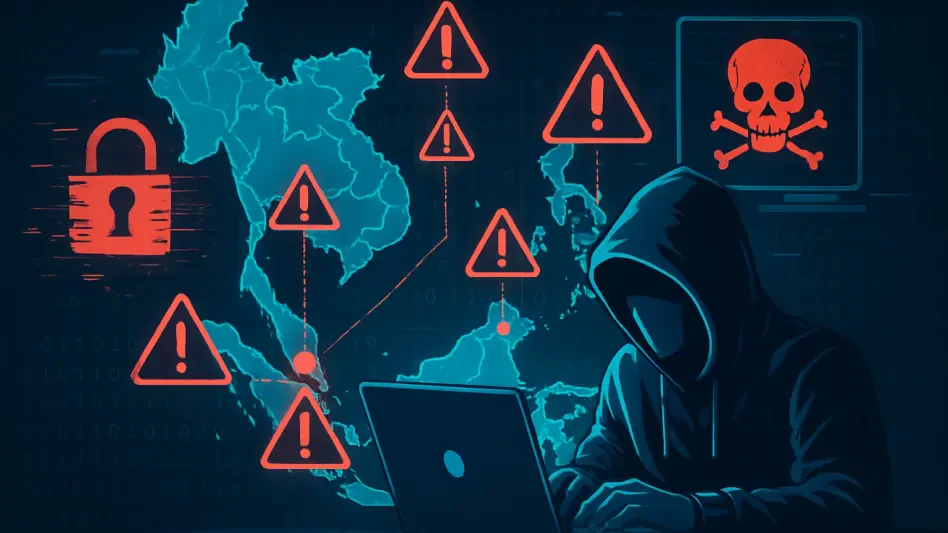The recent survey by KnowBe4 AFRICA reveals an alarming increase in concerns about cybercrime among Africans, capturing the heightened anxiety and financial apprehension prevalent across the continent. With a staggering 58% of respondents expressing high levels of anxiety, the fear of financial losses and identity theft has become palpable. This rising apprehension is driven by the growing reliance on digital transactions and sophisticated tactics employed by cybercriminals, presenting a significant threat to the region’s digital security landscape.
Rising Anxiety Over Cybercrime
Increased Awareness and Concern
The survey conducted by KnowBe4 AFRICA reveals a significant rise in concern levels, showing that those very worried about cybercrime nearly doubled from 29% to 58% between 2023 and 2024. This dramatic spike in awareness is likely due to targeted campaigns and personal encounters with cyber threats. As awareness campaigns intensify and incidents of cybercrime become more personal and widespread, it’s no wonder that anxiety over cybersecurity has reached unprecedented levels.
Furthermore, this increased concern is not confined to one sector but spans a diverse range of professional fields. The majority of respondents work in financial services, government, healthcare, real estate, and telecommunications sectors, emphasizing that cyber threats impact a broad spectrum of industries. Such widespread concern underscores the urgent need for robust security measures across all sectors. The escalation in anxiety is a clear signal that businesses and individuals alike must prioritize cybersecurity to safeguard against escalating threats.
Financial Stakes and Identity Theft
Nearly half of the respondents, approximately 49%, indicated that their primary concern is losing money to online fraud, highlighting the severe financial stakes involved in cybercrime. The prospect of significant financial loss serves as a potent reminder of the high-risk nature of digital transactions in today’s interconnected world. Beyond the immediate financial impacts, 26% of respondents expressed deep concerns over identity theft, which can lead to long-term repercussions far beyond monetary loss.
This sense of vulnerability is exacerbated by the fear that personal data can be easily exploited by cybercriminals, leading to unauthorized access to sensitive information. The potential financial and personal repercussions of cyber attacks are immense, reinforcing the need for comprehensive cybersecurity strategies. Financial institutions and other sectors must implement stringent security protocols to protect their clients’ data and build trust. As individuals become more aware of these risks, the collective effort to fortify digital defenses can pave the way for a more secure online environment.
Economic Impact and Cybercrime Trends
Financial Fraud and Economic Consequences
Economic ramifications are a major concern, with South Africa alone losing a staggering $3 billion to mobile app and digital banking fraud in 2023. The monumental losses incurred from such fraud underscore the pressing need for heightened security measures and more robust awareness campaigns. These campaigns must emphasize the direct economic impacts of cybercrime to make cybersecurity issues more relatable and pressing for the general populace. The numbers are a clear indication that inaction can lead to significant financial setbacks on both a personal and national level.
Moreover, the widespread panic over economic consequences is not unfounded. As financial transactions increasingly move online, the sophistication of cyberattacks has also escalated. The repercussions extend beyond immediate financial losses to affect economic stability and consumer confidence. Businesses and governments must work collaboratively to bolster cyber defenses and prevent such gargantuan losses. In doing so, they can not only protect their assets but also restore faith in the digital financial ecosystem.
Advanced Cybercriminal Tactics
Cybercriminals are adopting increasingly sophisticated methods like AI-generated deepfakes to enhance social engineering attacks, making it even more challenging to detect and prevent fraud. Deepfakes, which can convincingly mimic the faces and voices of trusted individuals, are used to manipulate and deceive targets into divulging sensitive information or making financial transactions. This escalation in tactics is a stark reminder of the evolving nature of cyber threats and the need for constant vigilance and advanced security measures across the continent.
Additionally, the use of advanced technologies by cybercriminals highlights the necessity for continuous innovation in cybersecurity defenses. Traditional methods of protection are no longer sufficient against the cunning and complex strategies employed by these adversaries. Businesses must invest in cutting-edge technology and engage in proactive threat hunting to stay ahead of cybercriminals. Advanced threat detection systems, AI-driven insights, and comprehensive cybersecurity training programs are essential tools in this ongoing battle. By embracing advanced security measures, Africa can ensure a safer digital landscape where innovation thrives securely.
Security Consciousness and Behavioral Trends
Cautious Sharing of Personal Information
The survey indicates a cautious approach to sharing personal information, with 47% of respondents stating they would only share such information if absolutely necessary. This cautiousness reflects a growing awareness of the risks associated with online data sharing and a desire to protect oneself from potential cyber threats. However, it’s concerning that a small percentage, around 14%, are still comfortable sharing personal data. This highlights areas for improvement in cybersecurity education and the need to emphasize the dangers of careless data sharing.
Despite the progress in awareness, the ease with which personal data is sometimes shared indicates a gap in practical cybersecurity knowledge. More efforts are needed to educate individuals about the importance of safeguarding personal information and the potential consequences of data breaches. Awareness campaigns must be tailored to address this issue, ensuring that people fully understand the risks and adopt more secure online behaviors. Strengthening the culture of cautious data sharing is a crucial step towards mitigating the threat of cybercrime.
Regional Differences in Data Sharing
The survey also revealed regional variations in data sharing behaviors, noting that Egyptians, Nigerians, and Kenyans are more likely to share personal data compared to South Africans, who tend to be more guarded with their information. Specifically, only 4% of South Africans were willing to share personal information compared to an average of 5.5% among other regions. This variation suggests the need for tailored awareness programs that cater to specific regional behaviors and cultural attitudes toward data sharing.
Understanding these regional differences is essential for developing effective cybersecurity strategies. For instance, in regions where individuals are more inclined to share personal data, awareness programs must focus on the risks and provide clear guidelines on protecting one’s information. Conversely, in regions with more cautious populations, the emphasis can be on reinforcing positive behaviors and addressing potential new threats. By acknowledging and addressing these regional differences, targeted campaigns can be more effective in instilling secure practices across all demographics.
Need for Comprehensive Security Measures
Human Risk Management and Training
Despite increased awareness, the survey’s findings highlight an ongoing need for comprehensive human risk management and training programs. While awareness is critical, it must be translated into practical cybersecurity practices to be effective. Investments in training are crucial for equipping individuals with the knowledge and skills necessary to recognize and respond to cyber threats. These initiatives are vital for creating a culture of cybersecurity that permeates all levels of society.
Moreover, human risk management should focus on behaviors that mitigate the risk of human error, which is often a critical factor in cybersecurity breaches. Regular training sessions, updates on the latest cyber threats, and hands-on experience in dealing with potential attacks can empower individuals to act wisely. Businesses should prioritize training programs that not only educate employees but also engage them in active participation to foster a strong security-oriented mindset, thereby enhancing overall cybersecurity resilience.
Mobile-Centric Security Education
The latest survey conducted by KnowBe4 AFRICA has uncovered a startling rise in concerns about cybercrime among Africans, highlighting growing fears and financial worries sweeping across the continent. An overwhelming 58% of those surveyed reported experiencing high levels of anxiety, particularly in relation to financial losses and identity theft. This heightened worry is attributed to the increasing dependence on digital transactions and the sophisticated methods cybercriminals are now using. The digital threats these activities pose have created a significant challenge for the region’s digital security. Consequently, the fear of falling victim to cyber-attacks has become a pressing issue, as more Africans engage in online financial activities. This shift emphasizes the urgent need for stronger cybersecurity measures to protect financial transactions and personal information, ensuring that the digital space is safe and secure for all users in the region. As digital reliance grows, so too must the commitment to bolstering defenses against cybercrime.







